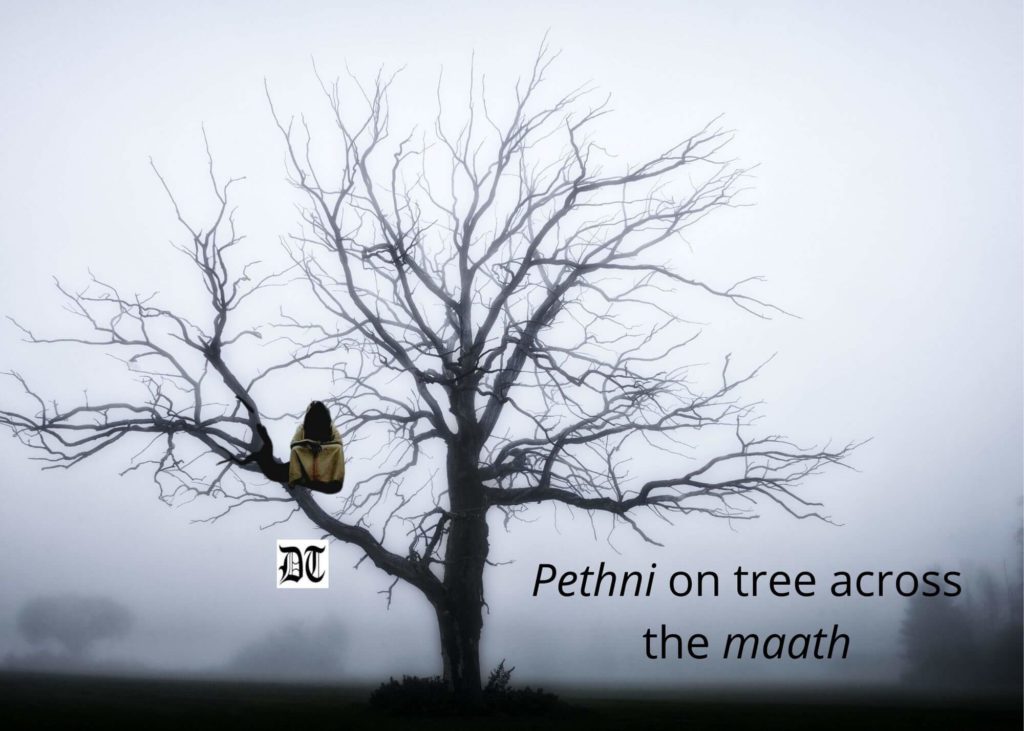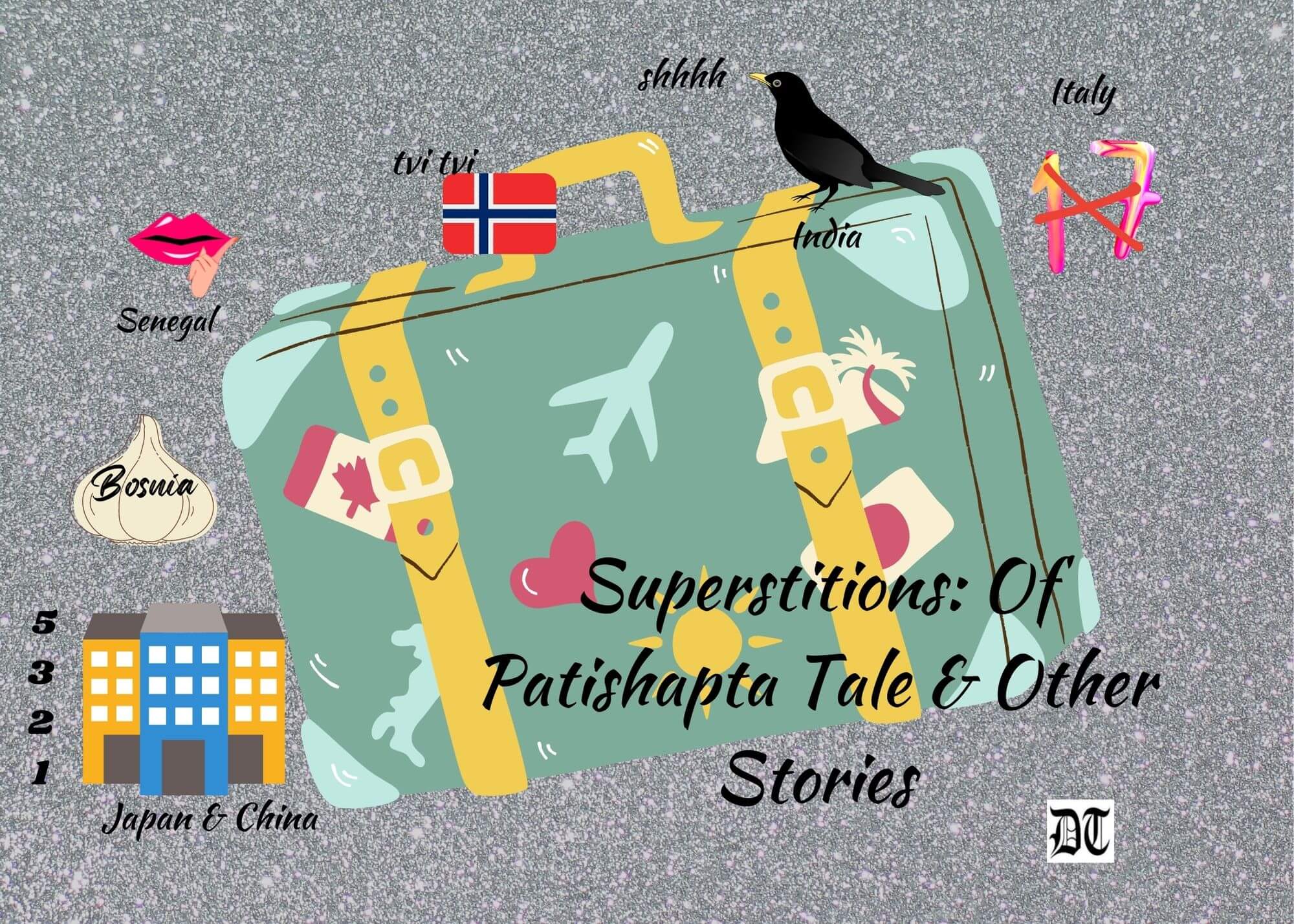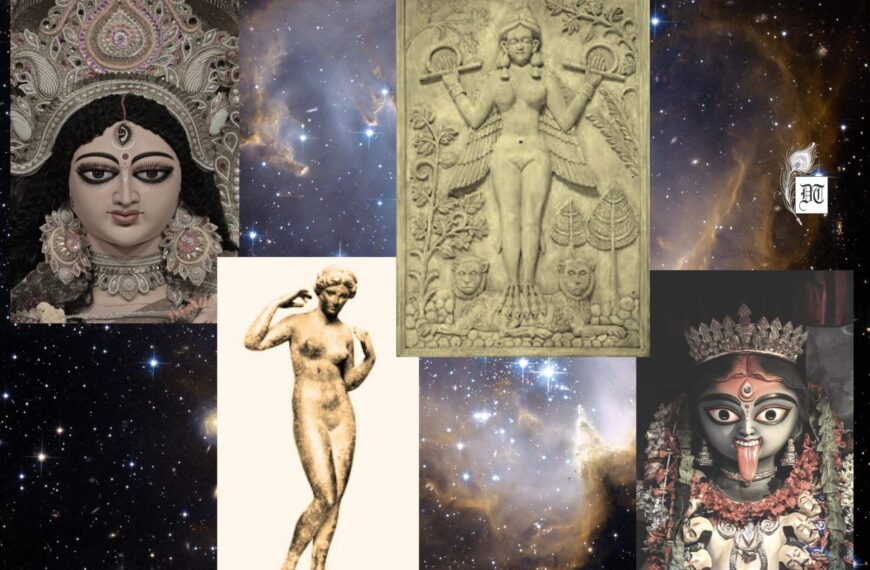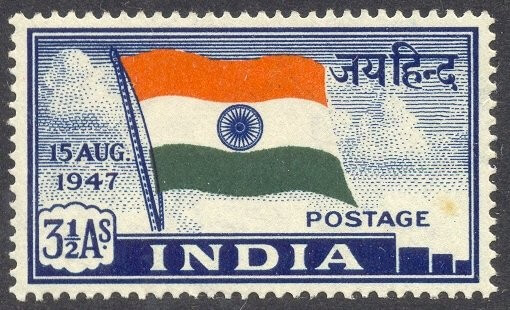Travels are fraught with superstitions around the world. Dr. Roopali tells us about superstitions associated with Patishapta, a Poush parbon delicacy, and other stories. An exclusive for Different Truths.

Journeys are fraught with danger and fears. Inexplicable and unknown hurdles lurk. There is something primeval about journeys. In the backdrop lie proto narratives of warriors like Ram, Arthur and Odysseus facing innumerable dangers and challenges.
The fear of strangers and the unknown haunts all of us. Some of us more than others. Cultures around the world appear to have superstitions associated with travel. Black cats crossing our path, the 13th or the 17th or the 4th floor of a hotel, Chaucer in The Canterbury Tales mentions Friday as an ominous day because of the crucifixion of Christ. Superstitious beliefs vary from culture to culture. Sometimes they are quite similar. And they might be different, but they all have a deep psychological impact.
In Senegal, people don’t share travel plans in case eavesdropping evil spirits decide to tag along…
In Senegal, people don’t share travel plans in case eavesdropping evil spirits decide to tag along as travel companions.
In Bosnia, a garlic clove is a compulsory travelling companion in one’s baggage. This keeps the stalking devil away and provides a smooth crossing of borders. In Serbia, the act of pouring water behind the traveller brings good fortune and effortless travelling. But do not sweep the house after a person has left on a journey. This would bring bad luck to the traveller.
In Norway, the traveller repeats tvi tvi to offer a curse. A cursed person is not the choice of evil spirits…
In Norway, the traveller repeats tvi tvi to offer a curse. A cursed person is not the choice of evil spirits, and you will be kept safe. In Russia you sit quietly on your luggage, close your eyes, and meditate before setting off. The idea being to compose yourself, think of things you may have forgotten, or just be prayerful. But don’t mention tvi tvi! That’s only in Norway!
In India, the cawing of a crow before setting off on travel or a funeral procession moving in the same direction of travel, portend disaster. And don’t walk under a peepal tree at night. They host ghosts of all types. That is the road least taken. But eating a spoon of yoghurt and honey wards off trouble.
In Nepal superstition abounds in daily life. In fact, it is quite normal to sacrifice two goats as appeasement for a malfunctioning car, or even an aircraft to get you safely to your destination.
In China, Japan, and Italy numbers play an important role.
In China, Japan, and Italy numbers play an important role. In Italy, the number 17 is taboo. An anagram of the Roman numeral XVII is VIXI. In Latin, this is translated to “I have lived”, implying, “my life is over.” Some Italian hotels and airlines have no row, room or floor numbered 17. Although, while in Rome don’t forget to throw a coin into the Trevi fountain. It will bring good luck.
In East Asia, the pronunciation of the character for the number 4 is “shi”, which is the same sound as the word for “death.” It is common not to find 4th floors or rooms numbered 4 in China and Japan.
In the West, thirteen guests at The Last Supper, make 13 an unlucky number for travel dates…
In the West, thirteen guests at The Last Supper, make 13 an unlucky number for travel dates, hotel rooms, and hotel floors. One of my close friends will not travel on the 13th day of the month, especially on Friday the 13th.
Father was a storyteller. A heady mixture of a soldier a scholar and a Bengali. Great story tellers…these. Mysterious happenings, magic and superstitious rituals were his forte. The log fire in winter warmed us and his stories made us shiver.
The earliest ones we heard were of witches called Petnis or Dayeen hanging about on beetle nut trees.
The earliest ones we heard were of witches called Petnis or Dayeen hanging about on beetle nut trees. From these tall slender trees, they made it their business to regularly pounce on any passing traveller carrying live magur fish in an earthen pot.

These travelling terrors happen in rural areas where one must cross vast heaths called maaths or maidans. It is in these marsh-like surroundings that ghosts with lanterns roam around. They way lay travellers passing through. These ghosts are also known as willow of the wisp.
Inebriated travellers are always waylaid by women in white with turned about feet.
Inebriated travellers are always waylaid by women in white with turned about feet. Their toes face backwards. The ghost story invariably gets the helpless drunkard out of a domestic violence situation. The suspicious wife can never fight off a ghost. The husband is always a victim of feminine wiles.
As a kid I loved the story about the Englishman and his cat. Father was travelling by train to Jhansi, which has a huge military cantonment. The train was several hours late. The old railway station had a sprawling first class retiring room. Father found an Englishman lounging on a sleeper type chair. It turned out that he was from Lancashire in England and was now homeward bound. He had earlier been deployed in Burma.
The summer heat was unbearable. The high ceilings and the whirring fan giving no respite. The man from England went off to the bath. Shortly a young railway steward came along with a small white bowl. He went straight to the dressing room adjacent to the bathroom.
As he closed the door behind him and was about to leave, Father stopped him. “What is it you left inside?”
As he closed the door behind him and was about to leave, Father stopped him. “What is it you left inside?” Father’s military intelligence nose had smelled a rat. The steward said, “cat’s meat,” and rushed off.
Cat’s meat? Oh my god! This Englishman had a fetish for savouring bizarre food. He was now quietly making a meal of it, pretending to be in the bath. Father was furious. He now waited to catch the cat eater. “Hey listen, Mister. You are eating cat’s meat here! This is India! What do you think you are doing?”
Father pushed him aside and went into the dressing room, where the platter lay licked clean.
“I beg your pardon sir?” the surprised man asked. Father pushed him aside and went into the dressing room, where the platter lay licked clean. What the b#**^y hell is going on? I am going to call the station master.” Father raised his voice. He was like that. He was a commando, who could eat goats, chickens, pigs, and even snakes. But cats?! That’s where he drew the line.
“Oh no, sir! Please don’t do that. My mother insisted I take Henry along. She was worried about me. Just for my safe journey. He was very hungry.”
“Now who the hell is Henry?”
Visibly shaken he went in and brought out a pet box.
“My lucky mascot. My cat. I got some mince for my cat.” Visibly shaken he went in and brought out a pet box. A beautiful cat with long whiskers meowed and showed its sharp teeth.
“You see sir, my mother was very worried about my travelling to India. Henry is our family mascot. Mother insisted I take him along so that my travels are safe. I beg your pardon but in England, India is considered a very unsafe place for travel.”
“You fellas are so ignorant and superstitious! Who would have thought! You brought him along all the way from England? You are travelling with a cat! And how, may I ask, is he going to protect you? Besides, your English language is now creating chaos. Cat’s meat and meat for cat. Good thing you lot are leaving!”
Poor Englishman. He had no desire to eat his cat.
I can’t remember when I last tasted a Patishapta.
Onward to the story of the Patishapta its connection with travel. I can’t remember when I last tasted a Patishapta. I never learned to make it because of what happened with I was a kid.
Come Poush Sankranti and out comes the special Bengali sweet called Patishapta. Sankranti is a harvest celebration, and people offer prayers and special food to their household deities.
This year Patishapta took over the media. Instagram, Facebook, Twitter, Sunday Supplements, cooking channels and videos. This is what lockdown has done to us. Turned us into foodies.
Also known as Pithey, Patishapta are rice flour crepes, filled with a mixture of coconut, jaggery or rice pudding.
Also known as Pithey, Patishapta are rice flour crepes, filled with a mixture of coconut, jaggery or rice pudding. It is a mouthwatering cherished delicacy not just in Bengal but also in Assam and Odisha in India. But as a travel companion it is a complete no-no. For a Bengali traveller the sight of it before or during a journey is filled with terror. A harbinger of unfulfilled travel plans.
In my childhood memory the Patishapta is a bewildering object. We were departing for Bangalore and mother awaited her cousin to bid goodbye. Aunt Buli Pishi arrived in a state of hysterics. “lukou, lukou,” she instructed my frightened mother. “Hide!” “Paakhi pagol ta pithey niye aashcchey.” (The mad woman Paakhi is bringing pithey.)
When stressed out, we Bengalis forget all other languages.
When stressed out, we Bengalis forget all other languages. Only Bangla can convey our true emotions. Everything turns into an emergency. “Cholo cholo,” Mother ran, dragging my stupefied sister and me out of the rear door of the guest house. That’s the door you sneak out of when you don’t or can’t pay your bills!
We ran out and tumbled into the waiting cab. Mother was behaving so irrationally egged on by her cousin. We had never ever eaten a Patishapta and now felt deprived and utterly miserable.
Throughout the journey my sister kept asking Mother about the sweet we had avoided at our peril.
Forbidden fruits are always mouthwatering. Throughout the journey my sister kept asking Mother about the sweet we had avoided at our peril. What did it look like, was it like chocolate? Why can’t we eat it? Mother had replied she didn’t want to hear or utter the dreaded word in case she conjured it.
The train took us safely away from the dreaded confection.
That night as the train swayed from side to side, I dreamt of a rasagulla syrupy dumplings with long blood dripping Dracula teeth.
Recently, on a Facebook drool post on Pithey/ Patishapta I enquired about superstitions surrounding this delicacy.
Recently, on a Facebook drool post on Pithey/ Patishapta I enquired about superstitions surrounding this delicacy. Some gourmands promptly went into denial.
Others chorused Yes! Yes. Of course. Several voices piped up. It was a very bad omen on a journey. But then the traveller had to be a Bengali. Several other foods associated with travel and bad luck popped up. Boiled eggs and bottle gourds.
There may be more science in it than meets the eye. The dripping jaggery from the drool Patishapta can turn yours into a sticky journey. Boiled eggs turn blue and toxic if not eaten soon, and the bottle gourd takes up space and may get squashed in the melee of railway travel.
In faraway mountain regions superstitions abound.
In faraway mountain regions superstitions abound. It takes weeks and months to reach one’s destination. The return journey remains a question mark. In India’s inhospitable forward areas where our troops face danger every moment, superstitions are the constant.
The ghosts of officers or soldiers or a shepherd who laid down their lives to protect a ridge, a bridge or a toll are often seen walking about performing their duty.
The journey is complete only when the traveller returns.
See you soon, safe journey, Au Revoir, Esho Giye (come again), Itte Irrashai (go and return) in all languages it is never Goodbye. The journey is complete only when the traveller returns. That is why all evil spirits, ghosts, seductive female ghosts, fish loving petnis and Patishapta craving “Bengali bhoots” must be kept away.
The Englishman hauling his cat across the oceans and lugging it around because his mom thought India was a dangerous place, sent us girls into fits of giggles.
Mother sighed, “Oh such an obedient son!”
***The Oxford English Dictionary (OED) defines superstition as “religious belief or practice considered to be irrational, unfounded, or based on fear or ignorance, excessively credulous belief in and reverence for the supernatural.”
Visuals by Different Truths






 By
By
 By
By

 By
By
Wow very topical and relevant issue that’s been delineated finely with examples. Yes superstition thrives even, so called modern society. Excellent writing ma’am